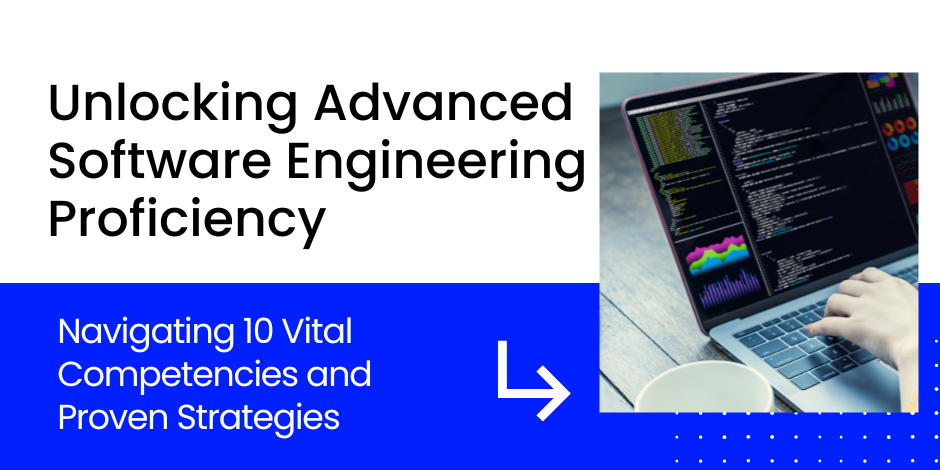Unlocking Advanced Software Engineering Proficiency: Navigating 10 Vital Competencies and Proven Strategies

Stay Informed With Our Weekly Newsletter
Receive crucial updates on the ever-evolving landscape of technology and innovation.
In today’s rapidly evolving tech landscape, advanced proficiency in software engineering is crucial for professionals looking to excel in their careers. With the increasing complexity of software systems and the constant demand for innovation, software engineers must possess a diverse skill set and a deep understanding of the field.
We will explore the 10 vital competencies contributing to advanced software engineering proficiency and provide proven strategies to enhance these skills.
Understanding advanced software engineering proficiency

Before delving into the specific competencies, it is essential to understand what advanced software engineering proficiency entails clearly. Proficiency in this context refers to the ability to perform tasks with expertise and efficiency, going beyond the basic competence typically required.
Software engineering is a multidimensional field that requires a diverse set of skills and knowledge.
Advanced software engineering proficiency encompasses technical skills, a comprehensive understanding of software development methodologies, problem-solving capabilities, and the ability to work collaboratively within a team.
When we talk about professionals with advanced software engineering proficiency, we refer to individuals who have gone above and beyond the average level of competence. These professionals possess a deep awareness of industry best practices, as well as continuous learning and skill improvement.
They are constantly seeking new ways to enhance their abilities and stay up-to-date with the latest advancements in the field.
Defining advanced proficiency in software engineering
Advanced software engineering proficiency involves more than just being proficient in a particular programming language or framework. It requires a holistic approach to software development, encompassing various aspects of the process.
One aspect of advanced proficiency is having a strong foundation in software development methodologies. Professionals with advanced proficiency understand the different methodologies, such as Agile, Waterfall, and DevOps, and know how to apply them effectively in different project scenarios.
They can adapt to changing project requirements and ensure that the development process is efficient and streamlined.
Another important aspect of advanced proficiency is problem-solving capabilities. Software engineers with advanced proficiency know how to identify and solve complex problems.
They can analyse a problem, break it down into smaller, manageable parts, and develop innovative solutions. Their ability to think critically and creatively sets them apart from others in the field.
Collaboration is also a key component of advanced software engineering proficiency. Professionals with advanced proficiency understand the importance of teamwork and can effectively communicate and collaborate with others.
They can work seamlessly with multidisciplinary teams, bringing together different perspectives and expertise to deliver high-quality software solutions.
The importance of advanced proficiency in today’s tech landscape
In today’s rapidly evolving tech landscape, possessing advanced proficiency in software engineering is more important than ever. The demand for skilled software engineers is high, and employers actively seek professionals who can contribute to their organisation’s success.
Having advanced software engineering proficiency sets individuals apart from the competition. It demonstrates their ability to tackle complex challenges and deliver high-quality code.
Employers recognise the value of skilled software engineers who can not only write code but also understand the bigger picture and contribute to the overall success of a project.
Advanced software engineering proficiency enables professionals to stay relevant in a constantly evolving field. Technology is advancing rapidly, and software engineers must learn and adapt to stay ahead continuously.
By investing in their skills and knowledge, professionals with advanced proficiency can ensure their long-term career growth and remain competitive in the job market.
The 10 vital competencies for software engineering

1. Technical skills and programming languages
Proficiency in programming languages such as Python, Java, and C++ is one of the vital competencies for software engineering. In addition to mastering one or more languages, having a solid foundation in data structures, algorithms, and computer architecture is essential.
A deep understanding of object-oriented programming principles and design patterns is also invaluable.
2. Problem-solving and critical thinking
Software engineers encounter a wide range of challenges daily. Advanced problem-solving and critical thinking proficiency allows professionals to analyse complex problems, identify the underlying issues, and develop effective solutions.
Strong analytical skills, attention to detail, and the ability to think creatively are essential competencies in this regard.
3. Knowledge of software development methodologies
Familiarity with agile methodologies such as Scrum and Kanban is crucial to advanced software engineering proficiency. Understanding how to manage projects effectively, implement iterative development cycles, and prioritise tasks is essential for delivering high-quality software within agreed timelines.
4. Understanding of data structures and algorithms
Data structures and algorithms form the foundation of software engineering. Advanced proficiency in this area involves comprehending the various types of data structures, such as arrays, linked lists, stacks, queues, and trees, and understanding how to implement them efficiently.
It also entails a deep understanding of algorithm design and analysis to ensure optimal performance.
5. Proficiency in system design
System design proficiency involves the ability to conceptualise and architect complex software systems. This competency encompasses designing scalable, modular, and maintainable architectures that fulfil both functional and non-functional requirements.
Proficiency in system design requires a comprehensive understanding of software architecture patterns, domain-driven design, and cloud computing principles.
6. Mastery of version control systems
Effective version control is essential for collaborative software development. Advanced proficiency in version control systems such as Git enables engineers to efficiently manage code repositories, track changes, and facilitate seamless collaboration with team members.
Proficiency in branching strategies, merge conflict resolution, and code review processes is crucial for successful software engineering.
7. Expertise in testing and debugging
Thorough testing and efficient debugging are critical for ensuring that software systems function as intended. Advanced software engineering proficiency includes developing comprehensive test cases, automating testing processes, and analysing test results.
Debugging expertise involves systematically identifying and resolving issues to ensure the reliability and quality of software products.
8. Familiarity with software architecture
Understanding software architecture principles and patterns is vital for software engineers aiming for advanced proficiency. This competency encompasses knowledge of architectural styles, such as client-server, microservices, and event-driven architectures, and the ability to apply suitable patterns to address specific design challenges.
Familiarity with architectural trade-offs and considerations related to performance, scalability, and security is also important.
9. Knowledge of security principles
As software systems become increasingly interconnected, ensuring security is a top priority. Advanced proficiency in software engineering requires understanding security principles and best practices, including secure coding standards, encryption algorithms, and secure authentication mechanisms.
Proficiency in identifying and mitigating common security vulnerabilities is also crucial.
10. Soft skills and teamwork
In addition to technical competencies, advanced software engineering proficiency involves strong soft-skills and the ability to work effectively within a team. Communication skills, adaptability, leadership, and the ability to provide constructive feedback are all essential qualities.
Collaborating with colleagues, participating in code reviews, and contributing to a positive team culture are critical factors for success.
Proven strategies to enhance software engineering proficiency

Continuous learning and skill upgradation
Software engineering is a rapidly evolving field, and continuous learning is key to maintaining advanced proficiency. Engaging in regular professional development activities such as reading technical books, attending conferences, and taking online courses helps expand knowledge and stay updated with the latest technologies, trends, and best practices.
Participating in coding challenges and hackathons
Coding challenges and hackathons provide valuable opportunities to put skills into practice and solve real-world problems within time constraints.
Participating in such events fosters creativity, hones problem-solving abilities, and exposes individuals to different approaches and perspectives. It also serves as a platform for networking and building relationships with industry professionals.
Collaborative work and peer reviews
Working collaboratively with fellow software engineers is an effective way to enhance proficiency.
Engaging in pair programming, conducting code reviews, and seeking peer feedback encourages continuous improvement and exposes professionals to different coding styles and techniques. Constructive criticism helps identify areas for growth and refine coding practices.
Real-world project experience
Getting hands-on experience with real-world projects is invaluable for gaining advanced software engineering proficiency. Working on challenging projects enables professionals to apply theoretical knowledge to practical scenarios, enhance problem-solving skills, and understand the complexities of software development in a realistic context.
Utilising online resources and platforms
The Internet offers many resources and platforms for skill development and knowledge acquisition. Learn from professionals in the field with the Institute of Data’s software engineering programs, which include practical training, industry certification and job placement support to help professionals secure a job in the software industry.
Conclusion
Unlocking advanced software engineering proficiency requires navigating through these 10 vital competencies. With a strong foundation in technical skills, problem-solving abilities, and knowledge of software development methodologies, software engineers can augment their expertise in system design, version control, testing, debugging, software architecture, security principles, and soft skills.
By embracing continuous learning, engaging in coding challenges, collaborating with peers, gaining real-world project experience, and utilising online resources, professionals can unlock their full potential and thrive in today’s dynamic tech landscape.
Ready to unlock advanced software engineering proficiency and improve your technical skills, problem-solving abilities and knowledge of the field? Check out our comprehensive program outline at the Institute of Data.
We also offer free career consultations with our local team if you’d like to discuss your options.





